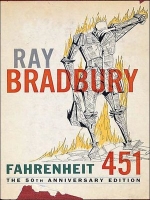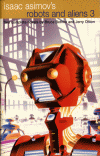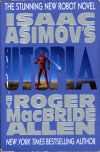Nobody is sure when exactly Isaac Asimov was born due to poor record keeping. January 2nd, 1920 was the day Isaac Asimov decided to celebrate his birthday. Along with creating the Three Laws of Robotics, Asimov also unintentionally coined the term robotics. It was first used in print when his short story “Liar!” was published in 1941. He was constantly writing in just about every area of literature. I have primarily read his Science Fiction, but he has done textbooks, humor, mystery, non-fiction, and more.
My first exposure to Asimov’s writing was when my father gave me an old worn out copy of I, Robot. I tucked the book away for a few years and eventually got around to reading it. I was so enthralled with the robots that I eventually read every robot book by him and other authors. This naturally led me to read the Foundation series which I also enjoyed, but I’ve always preferred the robot series. The Robot and Foundation books make up the biggest reading project I have ever completed. Aside from those, I’ve read a bit of his autobiography and plan on sampling some of his other writing in the near future.
By the time I discovered Asimov, he had already died. I wonder how much more he could have written had he not contracted HIV from a blood transfusion he received during heart surgery. He died of myocardial and renal complications on April 6, 1992, but the true cause of his death wasn’t publicized due to the stigma of HIV/AIDS at the time. His work has greatly influenced my love of Science Fiction, and for that I am thankful.
For more information on the life of Isaac Asimov, please visit the official Wikipedia post



1 thought on “Isaac Asimov would have been 90 today”